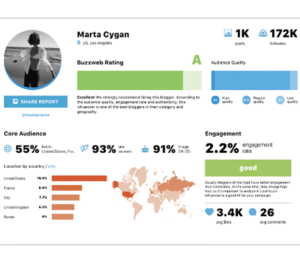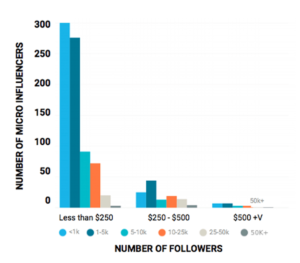Micro-influencers are not celebrities or even typical experts. They’re merely individuals who create compelling and engaging content on social media. With this content, they grab the attention of thousands of followers.
Micro-influencers usually share content in a typical vertical format and cater to the interests of target audiences. Audiences love hyper-engagement, and you can capitalize on this factor for your business. A micro-influencer will produce highly relevant content, vastly expanding your user engagement and reach.
Stats prove that 92% of customers trust micro-influencers more than celebrity endorsements or traditional ads. Also, micro-influencers convert 82% of the customers into buyers with their content.
What are micro-influencers? And why are they so effective?
Micro-influencers are not typical public figures. Instead, these individuals have extensive followings of about a thousand to hundred-thousand users. You won’t be wrong to consider them experts in a particular industry niche. If you look at the market statistics for micro-influencers, you’ll see how the percentages are rising, and even big brands are opting for them.
You will find all sorts of micro-influencers today, including food bloggers, financial bloggers, fashion bloggers, travel bloggers, fitness experts etc., to name a few. So influential are these individuals that they make up 85 percent of user engagement.
But why are they so effective? What is the reason behind their massive reach?
People trust and relate to micro-influencers better than they do with celebrities. It is perhaps how they interact individually or have more humble backgrounds like the masses that create a better point of connection.
Another reason is that influencers connect more personally because they share with a thousand or a hundred thousand followers at the most. This is a lot more than the millions of followers that celebrities and influencers have.
When you come across someone who understands your pain points and knows they have conquered similar struggles, you trust their solutions more. Besides, the more tight-knit group helps them create more personalized content and followers’ authentic moments.
What is the difference between micro and macro-influencers?
Macro influencers have a more extensive reach, perhaps twenty times more than a micro influencer’s audience. They are a better option for larger companies who desire a massive outreach for their marketing campaigns. If brands aim at a diverse and larger audience, the macro-influencers can give them just that and broadcast their message.
A good example is Samsung, which partnered with Cassper Nyovest for one of their campaigns. But the distinct difference is not only the number of followers but also the content. Micro-influencers usually talk about specific niches; this is why audiences regard them more like experts.
They have authentic voices which resonate with the communities and markets of the common people. Macro-influencers can cast a wider net, but then their content is mostly generic and not deeply insightful.
When you’re engaging an influencer for your business, you want to tap into your niche market and convey how people will find an incredible solution with you for their pain point. Your target audience gets to see genuine reviews, product feedback and can make better buying decisions with a micro-influencer’s help.
How to find micro-influencers to move the needle in your micro-influencer marketing
You may believe an influencer’s potential just because he/she sports a high follower count, but the reality might be different. You need quality and authenticity as a priority, but the process requires thoroughness.
After all, what good is your influencer if your needles are not turning and sales are not increasing? Hence, we have compiled the step-by-step process to find the best micro-influencer for growing your business.
1. Relevance
A micro-influencer needs to be relevant to your campaign. You can only hope for their dedicated following works to your advantage if your unique selling points align with what they specialize in. For example, you cannot expect a successful tattoo artist influencer to drive your toy company’s sales. Why? Simply because his/her niche does not align with yours.
Therefore, you must begin by researching and checking the background information on Google of your prospective influencers.

2. Look for audience authenticity score
Checking the authenticity of the influencer is your next important step. Often, high engagement rates do not translate into qualitative content, and that will no way drive your sales to need upwards. You want to draw authentic leads for the business. Hence, checking up on the genuineness of the numbers is crucial.
Your priority is more sales, not fake engagements, and we recommend running an audience authenticity score on your prospective influencers. You can use several methods for verifying engagement quality.
3. Engagement score
Once you verify their audience authenticity score and are sure their niche aligns with yours, your next step is to verify their engagement rate. It’s the main reason why you’re looking for an influencer, after all, isn’t it?
Brand awareness primarily spreads through the influencer’s fan base, and you want it to be significantly large. Hence, while you’re looking at stats, it’s a great idea to check their social media platforms. Look at how often they post, the response rate, and how updated they are with popular topics.
Remember, the best micro-influencer is one who directly communicates with his/her audience.
4. Confirm sufficient reach
If you have several potential micro-influencers on the list but want to pick the best, your next step is to assess their reach. Reach refers to the number of people who view the content the individual posts, which is a crucial factor.
You see, many businesses mistake impressions for unique. In terms of statistics, ‘impressions’ only tell you the log number of times the influencer displays the content, whether people click on it or not. But reach tells you how many people are actually reading the content.
Yes, you do need an engaging and relevant influencer, but at the same time, you want them to make a massive impact on your campaign’s visibility too. You can measure three main KPIs (Key Performance Indicators) for this:
- Traffic data- the amount of traffic the person drives to a site
- Impressions- the number of times the influencer brings a brand’s message before their target audience
- Followers- the number of fans the influencer has currently

How much do micro-influencers get paid?
One of the most influential factors in finding the right influencer is paying the right price. You also want them to attract leads for you in record time. Consequently, you need to employ the right talent with the correct pay scale.
On average, a business pays micro-influencers between $250 to $300 for sponsoring their posts.
If we talk about a typical micro-influencer (one with a fan base of 5,000 to 10,000 followers), they earn approximately $150 to sponsor a single post. They also receive an additional value of $100 to $150 on the free products or services they receive from the brand they’re endorsing.
However, influencer marketing is growing with time, and pay scales are rising in this industry.

Final thoughts
Micro-influencers are one of the most popular sources of successful marketing campaigns. Brands and businesses of all sizes now turn more towards these individuals, owing to how well they connect, engage with, and educate users.
Micro-influencers are the better option because they excel in a particular niche that aligns with that of businesses. If you’re looking for the best influencer for turning the needles around for your business, look for an influencer with a significant following, high audience authenticity rate, relevance, and higher reach.
Contact us to find the best influencer for your marketing campaign. We guarantee to boost your business with our experience and market expertise.






